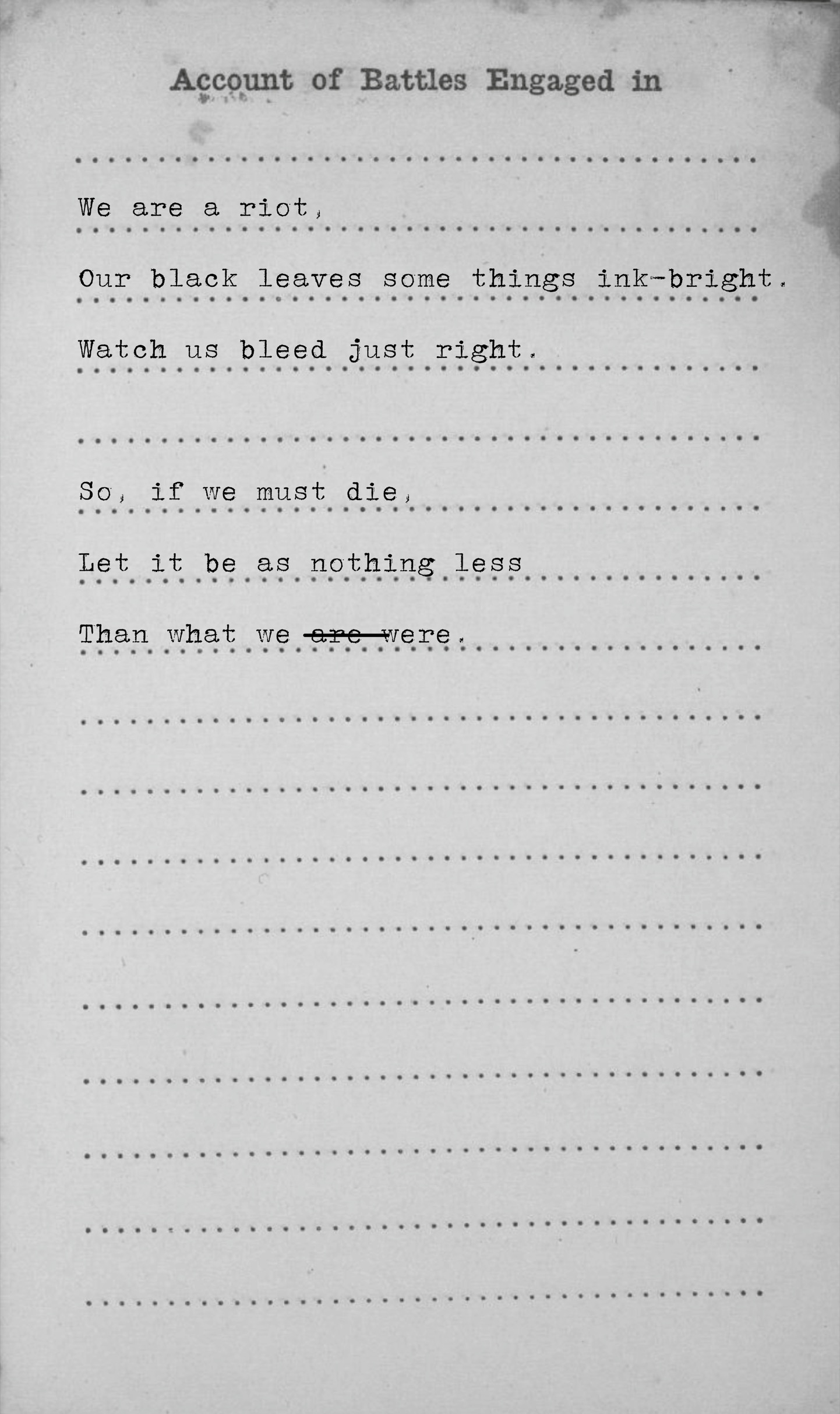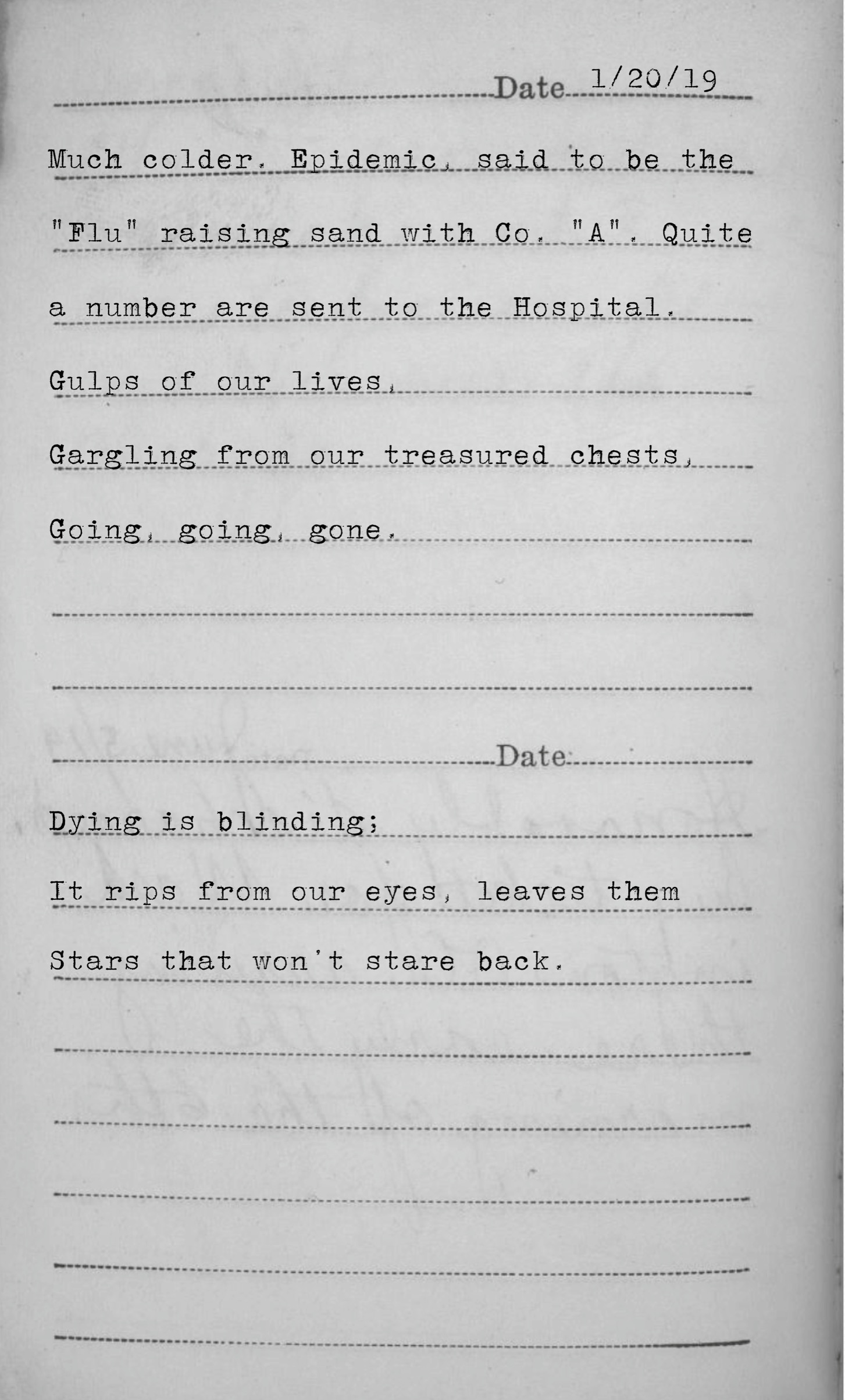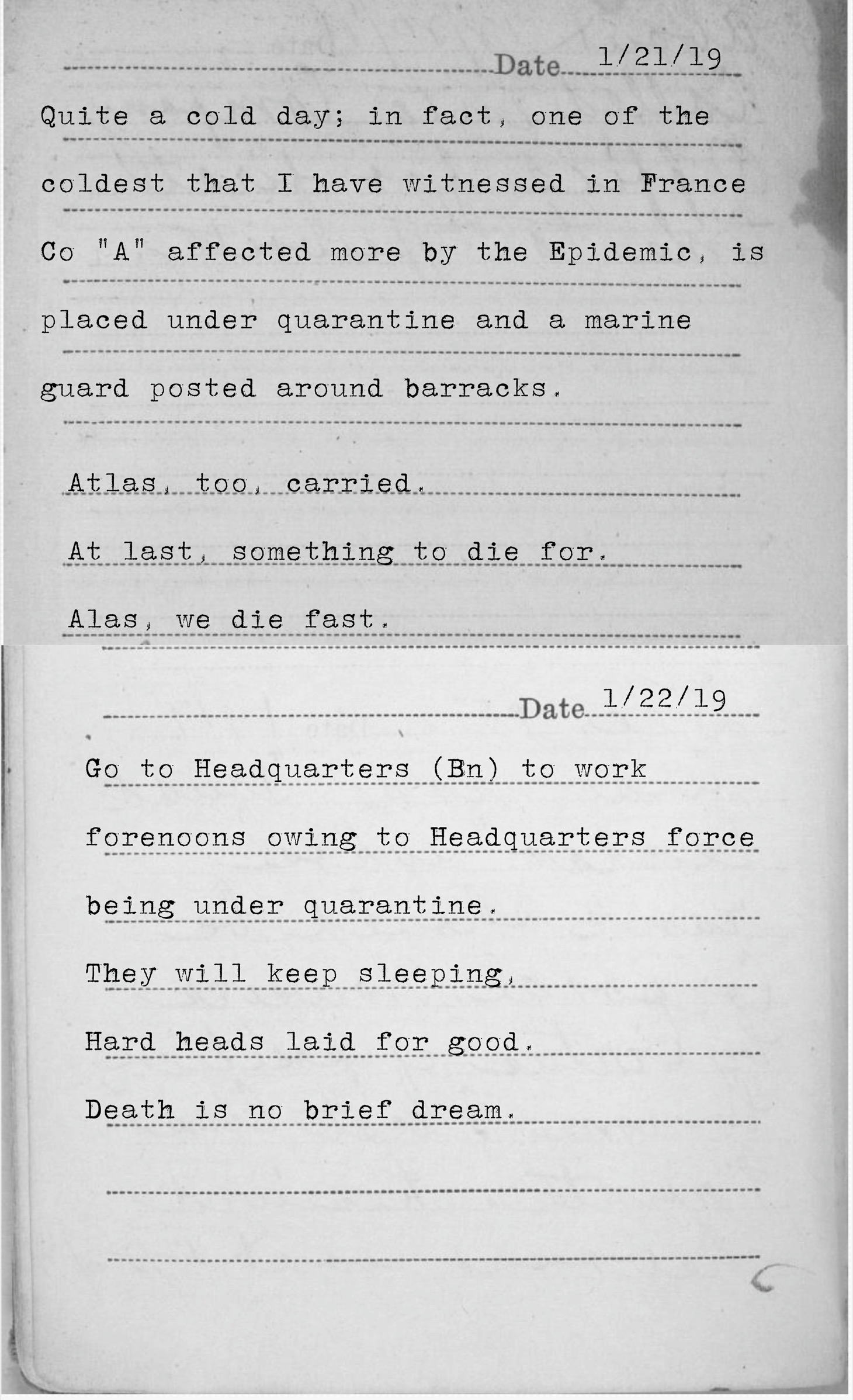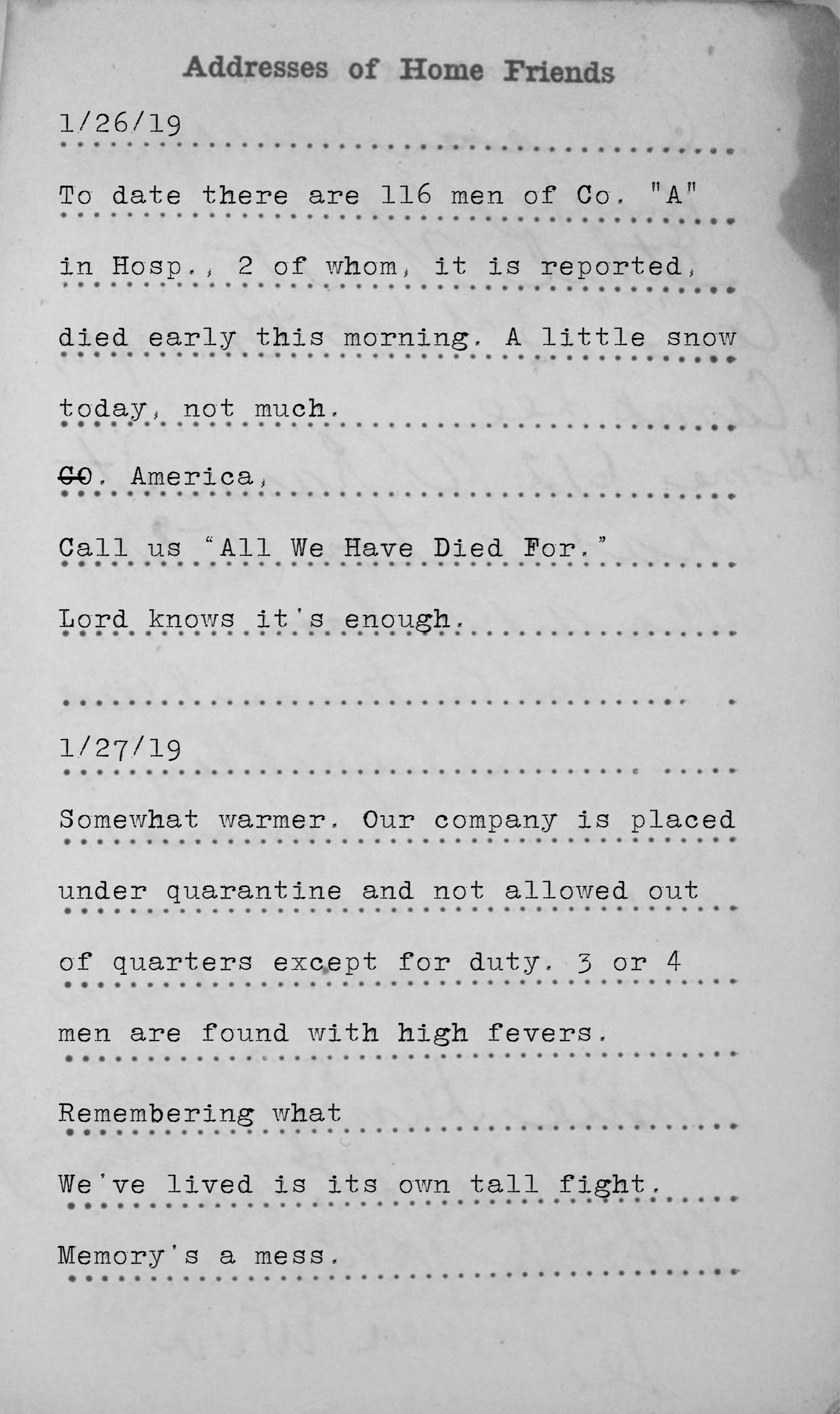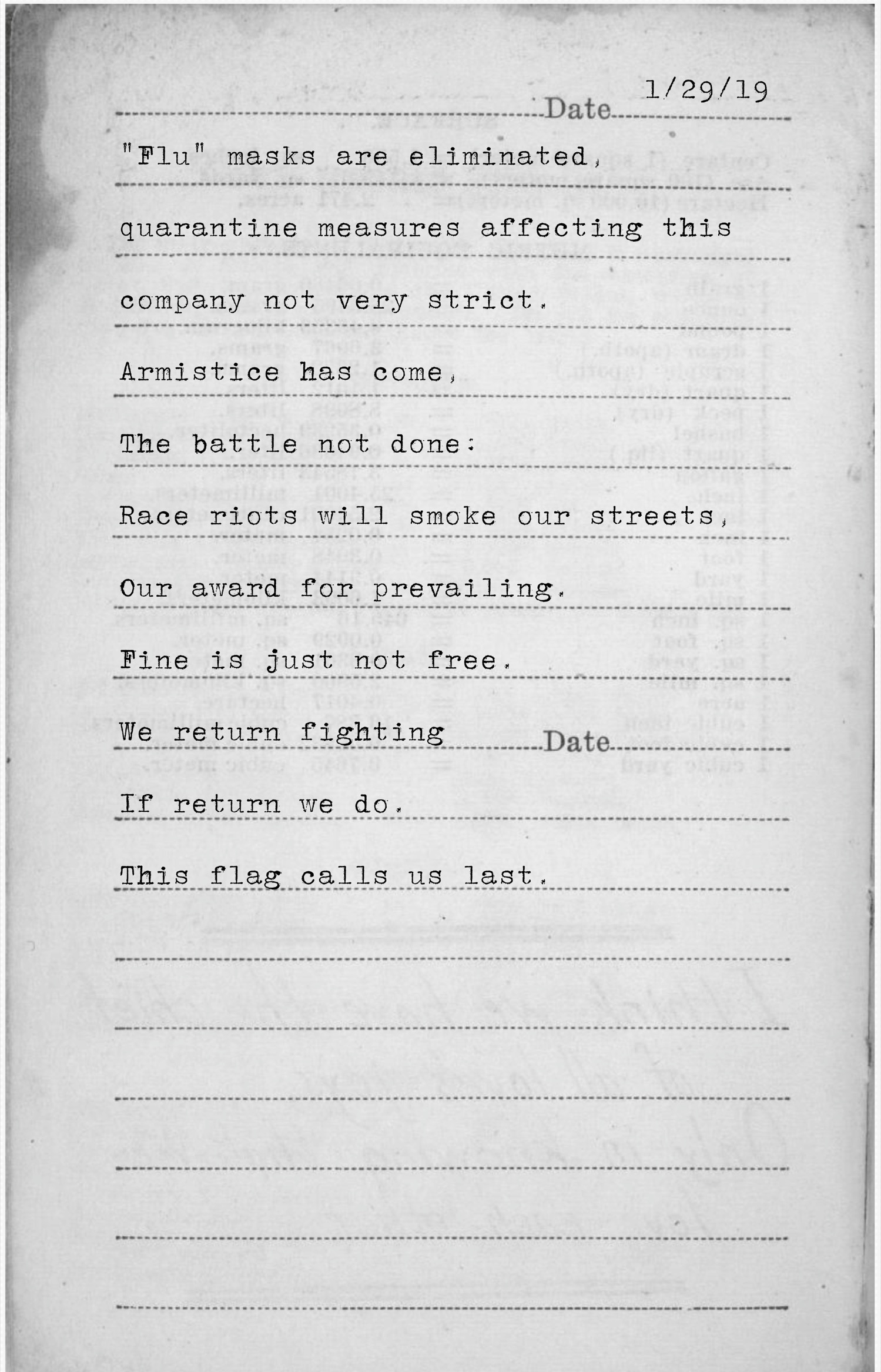Call Us What We Carry (5 page)
Read Call Us What We Carry Online
Authors: Amanda Gorman

Several of the following are erasure poems, meaning they’re documents with their pieces plucked out, just as some will call this the gone year, the long year, the glove year, the unlove year. The key to constructive—& not destructive—erasure is to create an extension instead of an extract. It’s not erasure, but expansion, whereby we seek the underwriting, the undercurrent beneath the watered surface of the words. It is to keep the words from drowning. Hereby the pen looks to enhance, evoke, explore, expose the bodies, the truth, the voices that have always existed but have been exiled from history & the imagination. In this case, we erase to find.
In a letter I received from you two weeks ago
I noticed a comma in the middle of a phrase.
It changed the meaning—did you intend this?
One stroke and you’ve consumed my waking days.
—Lin-Manuel Miranda,
Hamilton
Our scourge was to tell
The death of Cecilia—
Impossible
This plague attacked
It was brought here
It spread rapidly
Stopped regular activities
Devoted itself absolutely
We lost comparatively everything possible
The sick was never one someone
We want to feel
This sickness
Spared neither expense nor time nor trouble.
Altogether we could be done
This disease upon the country
Was worse here than elsewhere
It was not due
Now that the plague resumed
Our work we have now
Trusting body we are
*
*
Letter of condolence from Superintendent of the Yakama Indian Agency, Washington, October 29, 1918. Bureau of Indian Affairs.
Everybody has to die
We consider ourselves lucky
Believe us
We were there & yet we intended staying,
Home a whole string of things we can’t begin to name
Oh!
The first that died sure unnerved us
Sunrise is such a horrible thing
& yet
Every day
We are called & waiting
If fortune favors us, we may find ourselves.
Squeeze the life out of our hand
There is so much to be said
We don’t believe we should
Ever get through
One year normal
Maybe we remember now.
All the schools, churches, theaters, dancing halls, etc.
Are closed here also.
There is a bill in the Senate.
We can’t help but hope.
Ha! Ha!
If we are not dead
Write
Write
To be
To do
To—
†
†
To her friend at the Haskell Indian Nations University, Kansas, October 17, 1918. Bureau of Indian Affairs.
To hand right respect
To the negroes—
To Father death.
Do not come for them.
This is our opinion—
As they are given
By the will, the word.
All negroes considered Debts,
Parts which we are entitled to.
A sort of epidemical cold
Has seized every business &
Establishment our health afflicted,
We have recovered,
The incision made
By this impost-
Hume has been cured.
Join us in every good.
‡
‡
Letter from George Washington to Betty Washington Lewis, October 12, 1789. National Archives.
They stood away.
Made their own sick.
People hoping—
God, take away the illness.
Everyone grew
Weaker & weaker.
The strongest carried
Everyone.
Protest.
Daniel was two;
He was just a little boy.
His body took him away.
§
§
An account by Selma Epp, who was a child in a Jewish neighborhood in North Philadelphia during the 1918 influenza epidemic.
Usually people
Fall
People
dy
People
should not have died.
Most of them immigrants.
These people came Promised Land.
They came fresh
& they got
Destroyed.
¶
¶
Account of Michael Donohue, whose family ran a funeral home when the 1918 influenza epidemic struck.
Our common era can tell
Who a person was,
Where he lived, what he died of.
But we become sloppy
& confused, crossed out,
Scribbled in borders—
It’s nearly impossible to track
Tragedy & turmoil.
We didn’t.
We buried people we knew.
We buried strangers.
A girl.
To take care of people
Was the decent thing to do.
We had a responsibility.
Scribbled at the bottom
The ‘girl,’
‘This girl was buried in the trench.’
This girl was our trench.
Where else to put her.
**
**
Donohue on his Family Ledgers.

To view as reflowable text, see
this page
†† From the article “The Riots: An N.A.A.C.P. Investigation,” written by James Weldon Johnson in the NAACP’s
The Crisis
magazine in 1919.
- .... . / ... --- .-.. -.. .. . .-. ...
How true to life,
All too true . . . you sing the Achaeans’ fate,
All they did and suffered, all they soldiered through,
As if you were there yourself or heard from one who was.
—Robert Fagles (translator),
The Odyssey
(8.548–551)
Roy Underwood Plummer (1896–1966) was born in Washington, DC, & enlisted in the army in 1917. Corporal Plummer served in France in Company C of the 506th Engineer Battalion, which built roads, fortifications & conducted other manual labor that was essential to the army. Around 160,000 African American soldiers served as Services of Supply troops in France, enabling the critical supply & movement of white combat troops.
Plummer dutifully kept a diary throughout the war. His background as a clerk is exemplified by his precise
understanding of grammar (he often crosses out or corrects himself, as if aware that someone else will be reading his work), impeccable handwriting & clear-cut descriptions of his experiences. Plummer’s journal, housed at the National Museum of African American History and Culture, has been fully transcribed & digitized by the Smithsonian Transcription Center.
After the war, Plummer returned to Washington, DC, & practiced medicine in the District of Columbia for over forty years.
‡‡




